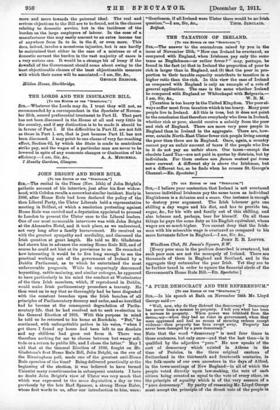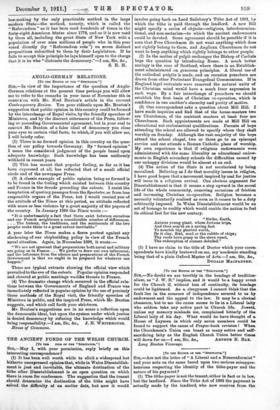"A PURE DEMOCRACY AND THE REFERENDUM."
[TO THE EDITOR Or THE " SFECTATOR."]
SIR,—In his speech at Bath on November 24th Mr. Lloyd George said:— "Well, now, why do they distrust the democracy ? Democracy has never been a menace to property. I tell you what has been a menace to property. When power was withheld from the demoQ,,tcy—when they had no voice in government, when they were oppressed and had no means of securing redress except violence—then property has been swept away. Property has never been damaged by a pure democracy."
Note that the word " democracy " is used four times in these sentences, but only once—and that the last time—is it qualified by the adjective "pure." He now speaks of the sort of democracy which existed in Athens in the
time of Pericles, in the three original cantons of Switzerland in the thirteenth and fourteenth centuries, in the folk-moots of our own ancestors in the days of Alfred, in the town-meetings of New England—in all of which the people voted directly upon law-making, the vote of each citizen being counted as equal to the vote of every other, on the principle of equality which is of the very essence of a " pure democracy." By parity of reasoning Mr. Lloyd George must accept the principle of the direct vote of the people in law-making by the only practicable method in the large modern State—the method, namely, which is called the " Referendum " as it has been used hundreds of times in the forty-eight American States since 1778, and as it is now used by them all, including the great State of New York with a population of over nine millions of people who in this year voted directly (by " Referendum vote") on seven distinct propositions submitted to them by their Legislature. If he fails to accept this principle he lays himself open to the charge that it is he who "distrusts the democracy."—I am, Sir, &c., S. R. H.



































































 Previous page
Previous page